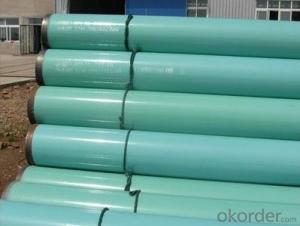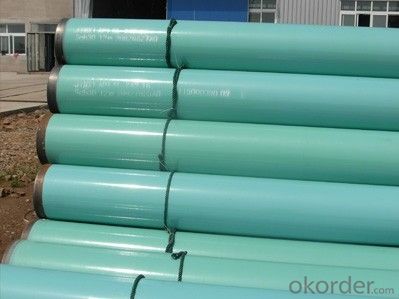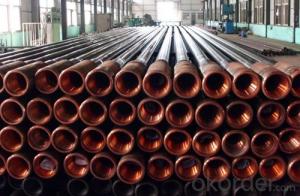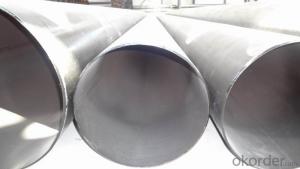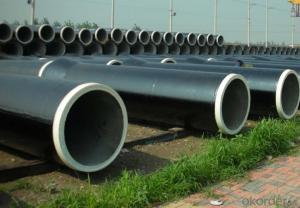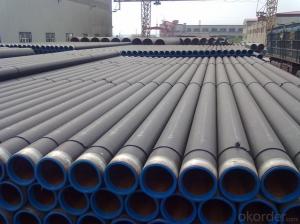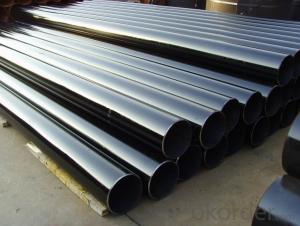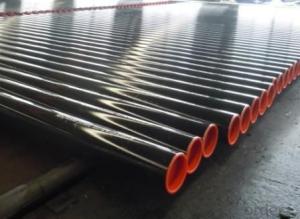API 5L 3PE COATED STEEL PIPE
- Loading Port:
- China Main Port
- Payment Terms:
- TT OR LC
- Min Order Qty:
- -
- Supply Capability:
- -
OKorder Service Pledge
OKorder Financial Service
You Might Also Like
Packaging & Delivery
| Packaging Detail: | Plastic plugs in both ends Hexagonal bundles of max. 2000kg with several steel strips Two tags on each bundle Wrapped in waterproof paper PVC sleeve and sackcloth with several steel strips Plastic caps |
| Delivery Detail: | within 45 days after confirmation |
Specifications
API 5L PSL1/PSL2 Gr.B/X42/X52/X56/X60/X65/X70/X80 3PE/FBE Coated Line Pipe
OD: 2"-30",
WT:0.250"-4"
L:random,fixed,SRL,DRL
Application
Used for construction of long distance pipelines for combustible liquids and gases, nuclear station pipelines, heating system pipelines, general-purpose pipelines, vessels manufacturing, mechanical engineering and instrumental engineering.
DISTINCTIVES FEATURES
A) The External surface is shot-blasted (Sa 2 1/2) by removing millscale and rust, obtaining metal surface to facilities the adhesion.
B) The pipe is heated in a electric or gas oven at a controlled temperature.
C) The adhesive is then applied by hot meit or copolymer. It binds the polythylene to the steel.
D) Immediately afterwards, the extruded polyethylene/polyprophylene is coated on the pipe.
E) After application of the polyethylene/polyprophylene, the pipe is coated by spraying water.
Process
SEAMLESS
HOT ROLLED
COLD DRAWN
WELDED
ERW (Electric Resistance Welded)
HFI (High Frequency Induction)
EFW(ELECTRIC FUSION WELDED TUBE)
LSAW (Longitudinal Submerge-arc Welded) UO(UOE),RB(RBE),JCO(JCOE)
DSAW (Double Submerged arc welded)
SAW (Spiral Welded)
SSAW (Spiral Submerged-arc Welded)
Quality Standard
SEAMLESS PROCESS
GB/T 8163 Seamless steel tubes for liquid service
ASTM A106 Standard Specification for Seamless Carbon Steel Pipe for High-Temperature Service
DIN 1629 SEAMLESS CIRCULAR TUBES OF NON ALLOY STEELS WITH SPECIAL QUALITY REQUIREMENTS
API 5L Line Pipe
WELDED PROCESS
ERW HFI , EFW, LSAW, DSAW
GB/T3091 Welded steel pipe for low pressure liquid delivery
GB/T9711 Petroleum and natural gas industries--Steel pipe for pipelines
EN10217 Welded steel tubes for pressure purposes.
IS 3589 Steel tubes for water and sewage
IS 1978-1982 Steel tubes for use in transportation of oil; gas & Petroleum products
BS 1387 Steel Tubes for use for Water, Gas, Air and Steam
ASTM A53 Standard Specification for Pipe, Steel, Black and Hot-Dipped, Zinc-Coated, Welded and Seamless
DIN 2458 WELDED STEEL PIPES AND TUBES
API 5L Line Pipe
SAW SSAW
SY/T5037 Spiral submerged arc-welded steel pipe for pipelines for low pressure field fluid service
SY/T 5040 Spiral submerged arc-welded steel pipe piles
CJ/T 3022 Spiral submerged-arc welded steel pipe for municipal heat supply
IS 1978 Steel tubes for use in transportation of oil; gas & Petroleum products
API 5L Line Pipe
Coating Standard
ANSI/AWWA C104/A21.4 American National Standard for Cement-Mortar Lining for Ductile-Iron Pipe and Fittings for Water
ISO 21809 Petroleum and natural gas industries -- External coatings for buried or submerged pipelines used in pipeline transportation systems
DIN 30670 Polyethylen coatings of steel pipes and fittings
Steel Grade
SEAMLESS PROCESS
GB/T 8163 10# 20# 35# 45# 16MN(Q345B)
GB 3087 10# 20# 35# 45# 16MN(Q345B)
GB 5310 20G 12Cr1MoV 12Cr1MoVG 12CrMoG
ASTM A106 Gr A Gr B Gr C
DIN 1629 St 37.0 St 44.0 St 52.0
API 5L A B X42X46 X52 X60 X65 X70 X80
WELDED PROCESS
GB/T3091 SY/T5037 SY/T 5040CJ/T 3022
Q195 Q215 Q235 Q275 Q295 Q345 08F 08 08AL 08F 10F 10 HG5 DF08 SPHC M8
BS 1387 EN10217 S185 S235 S235JR S235 G2H S275 S275JR S355JRH S355J2H St12 St13 St14 St33 St37 St44 ST52
ASTM A 53 Gr. A Gr B Gr C Gr.D
API 5L A B X42 X46 X52 X56 X60 X65 X70
GB/T9711 L175 L210 L245 L290 L320 L360 L290 L320 L360 L390 L415 L450 L485 L555
Size
SEAMLESS PROCESS
Outer Diameter Hot finish 2" - 30" Cold drawn 0.875" - 18"
Wall Thickness Hot finish 0.250" - 4.00" Cold drawn 0.035" - 0.875"
Length Random Length Fixed Length SRL DRL
WELDED PROCESS
ERW HFI EFW
Outer Diameter 6mm-610mm (1/16"-24")
Wall Thickness 0.3mm-22mm
Length 0.5mtr-20mtr
LSAW DSAW
Outer Diameter 219mm-1820mm
Wall Thickness 5.0mm-50mm
Length 6mtr-18mtr
SAW SSAW
Outer Diamter 219.1mm - 4064mm (8" - 160")
Wall Thickness 3.2 mm - 40mm
Length 6mtr-18mtr
End
square ends (straight cut saw cut and torch cut);
beveled for welding (All line piping is square cut to the tolerance specified and bevelled to ANSI B16.25. An angle of 30º (-0º +5º) and a landing of 16 mm ±08 mm is applied. Schedule 160 material is supplied without bevelling.)
Surface Lightly oiled Hot dip galvanized Electro galvanized Black Bare Varnish coating/Anti rust oil Protective Coatings (Coal Tar Epoxy Fusion Bond Epoxy 3-layers PE)
Test Chemical Component Analysis Mechanical Properties (Ultimate tensile strength Yield
strength Elongation) Technical Properties (Flattening Test Bending Test Hardness Test Blow Test Impact Test etc.) Exterior Size Inspection Hydrostatic Test(The standard pressure is limited to 207 MPa (3000 psi)) X-ray Test.
Mill Test Certificate EN 10204/3.1B
Third party inspection SGS BV Lloyds etc.
- Q: How do steel pipes perform in corrosive environments?
- Steel pipes perform well in corrosive environments due to their natural corrosion resistance. The addition of protective coatings or linings further enhances their performance, making them highly durable and suitable for a wide range of applications in such environments.
- Q: How do steel pipes withstand pressure?
- Steel pipes withstand pressure due to their inherent strength and resilience. The high tensile strength and durability of steel allow it to withstand the internal pressure exerted by fluids or gases flowing through the pipes. Additionally, the thick walls and cylindrical shape of the steel pipes distribute the pressure evenly, preventing any deformation or rupture. The seamless construction of steel pipes further enhances their ability to withstand pressure, making them a reliable choice for various applications in industries such as oil and gas, plumbing, and construction.
- Q: Can steel pipes be bent or curved?
- Yes, steel pipes can be bent or curved.
- Q: What does "spiral welded steel pipe" DN325*10 mean?
- Spiral welded steel pipe with nominal diameter of 325mm and wall thickness of 10mm
- Q: What does the diameter of a steel pipe project mean?
- Suppose we specify a standard that defines the nominal diameter of the same steel tube as G-1, then this G-1 is the same as DN50.I hope it doesn't make you any more confused, huh?. If you still don't understand, keep in mind that the nominal diameter is neither outside nor inside diameter.
- Q: How are steel pipes classified based on pressure ratings?
- Steel pipes are classified based on pressure ratings by assigning them different schedules, ranging from Schedule 10 to Schedule 160. Each schedule represents a different maximum pressure that the pipe can withstand, with higher schedules indicating higher pressure ratings.
- Q: Is the electric pipe used with steel pipe or PVC pipe?
- When the electric wire pipe is laid, the steel pipe can be adopted, or the plastic pipe can be adopted, but the steel tube must not be used in the ceiling. The standard explanation is for rat bite.
- Q: How do you calculate the weight of steel pipes?
- To calculate the weight of steel pipes, you can use the formula: weight = volume × density. The volume of a steel pipe can be calculated by multiplying its cross-sectional area (πr²) with its length. The density of steel is typically known, or you can refer to a density table. By plugging in these values, you can determine the weight of steel pipes.
- Q: Can steel pipes be used for underground water wells?
- Indeed, underground water wells can utilize steel pipes. The selection of steel pipes is frequently based on their robustness and resilience, rendering them apt for enduring the exerted force and load of the encompassing soil and water. They are extensively employed in residential and industrial settings for the purpose of drilling and constructing water wells. Nevertheless, it is crucial to take into account specific factors including the steel's type and quality, along with the existence of corrosive components in the water, in order to ensure the durability and dependability of the well system. Moreover, adequate insulation and coating might prove necessary to avert corrosion and contamination of the subterranean water source.
- Q: How are steel pipes used in the manufacturing of agricultural machinery and equipment?
- Steel pipes are widely used in the manufacturing of agricultural machinery and equipment due to their various beneficial properties. These pipes are utilized in several ways to enhance the efficiency and durability of agricultural machinery. One of the primary uses of steel pipes in agricultural machinery is for the construction of frames and chassis. The high strength and structural integrity of steel pipes make them ideal for supporting heavy loads and withstanding the rigorous conditions often encountered in agricultural operations. Whether it is a tractor, combine harvester, or tillage equipment, steel pipe frames provide the necessary stability and sturdiness required for these machines to perform efficiently in the field. Steel pipes are also commonly used in the hydraulic systems of agricultural machinery. These pipes serve as conduits for hydraulic fluids, allowing for the smooth and reliable operation of various components such as hydraulic cylinders, pumps, and motors. Due to their resistance to corrosion and high pressure, steel pipes ensure the longevity of hydraulic systems, reducing maintenance and repair costs for agricultural machinery. Furthermore, steel pipes find applications in the exhaust systems of agricultural equipment. The exhaust gases produced by engines need to be safely and efficiently expelled to minimize environmental impact and maintain engine performance. Steel pipes with appropriate thickness and thermal resistance are used to construct exhaust systems, allowing for the effective removal of exhaust gases and reducing noise pollution. In addition, steel pipes are utilized in the manufacturing of irrigation systems and equipment used in agriculture. Whether it is for transporting water from a source to the fields or distributing water to crops through sprinklers or drip irrigation, steel pipes offer the necessary durability and resistance to pressure, ensuring efficient water delivery and minimizing leaks. Overall, the use of steel pipes in the manufacturing of agricultural machinery and equipment is crucial for enhancing their performance, durability, and efficiency. The strength, structural integrity, resistance to corrosion, and high pressure capabilities of steel pipes make them indispensable components in various applications within the agricultural sector.
Send your message to us
API 5L 3PE COATED STEEL PIPE
- Loading Port:
- China Main Port
- Payment Terms:
- TT OR LC
- Min Order Qty:
- -
- Supply Capability:
- -
OKorder Service Pledge
OKorder Financial Service
Similar products
Hot products
Hot Searches
Related keywords
